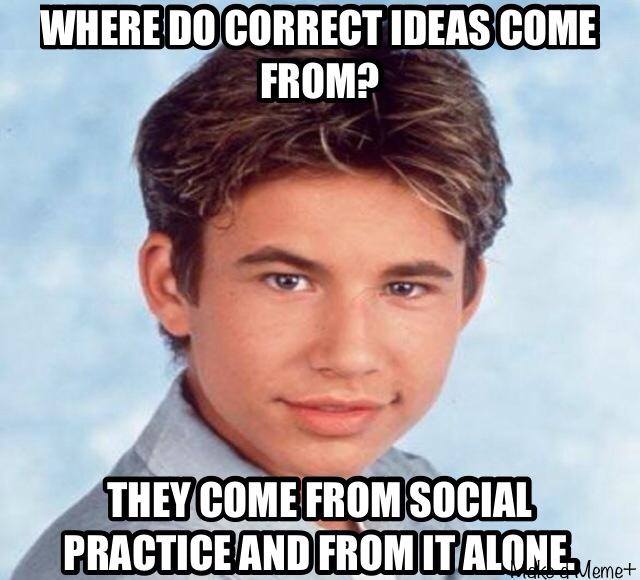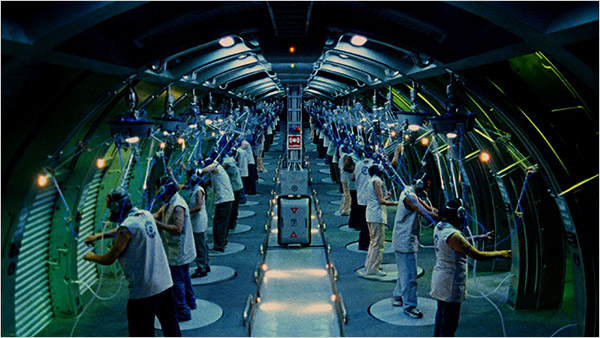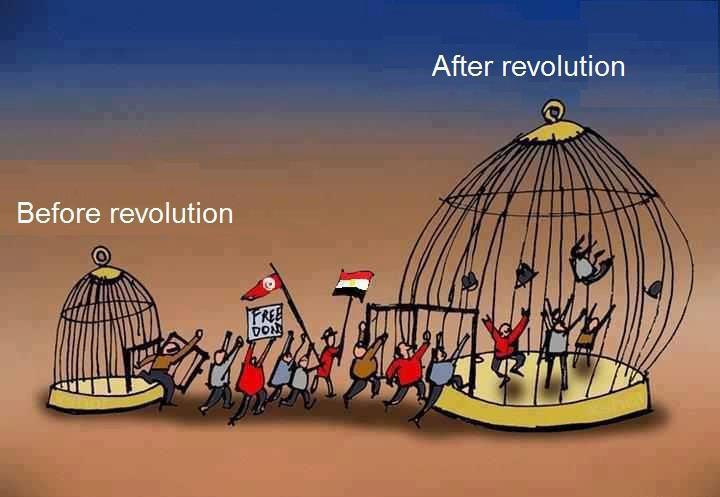or what are we to do about Maoism
One of the reasons that anarchism has become a popular political perspective is because in many contexts (for instance mass mobilizations or broad direct action campaigns) we seem open, friendly, and nonsectarian. This is in great contrast to visible (and visibly) Marxist or Leftist organizations, which either seem like newspaper-selling robots or ancient thorny creatures entirely out of touch with the ambivalence of the modern political atmosphere. Anarchists seem to get that ambivalence and contest it with hope and enthusiasm rather than finger-wagging.
The public face of anarchism tends towards approachability and youth: kids being pepper sprayed, the general assemblies of the occupy movement, and drum circles. These are the images of the past five years that stand in contrast to the image of anarchists as athletic black clad window breakers. Both are true (or as true as an image can be) and both demonstrate why a criticism of anarchists continues to be that (even at our best) we are politically naïve.
Of course very few window breakers believe that breaking windows means much beyond the scope of an insurance form or a janitorial task, but that is beside the point. What matters is that the politics of no demands makes the impossible task of intelligent political discourse in America even more complicated (by assuming that discourse is a Pyhrric act). To put the issue differently, the dialectical binary of both engaging in the social, dialogic, compromising act of public politics while asserting that there is no request of those-in-power worth stating or compromising on isn’t possible. It is cake-and-eat-it thinking that is exactly why Anarchists must do what Anarchist must do1.
This rejection of how the game is played while participating in it hasn’t shown itself to be a long term strategy– impossible never is. For lessons on playing the game we have to turn to the winners of politics and revolution: neoliberalists, sure, but also statist Marxists, reactionaries (from racist populists to nationalist Know Nothings or their descendants in the Tea Party), and what remnants exist of the old and new Left. Just to make the point crystal clear I’ll restate it. On the one hand you have the ridiculous non- or even anti-strategy of anarchist political theater that cannot achieve the impossible goal of everything for everybody forever. On the other hand you have realpolitik: the pragmatic application of power in the political sphere. This simplistic dualism is why most intelligent people abandon politics altogether and retreat to NIMBYism (at best) or the quiet solitude of screaming at a television screen as the only expression of engagement with the outside world.
In this light, a discussion about maoism might seem outrageous and it is! Maoism isn’t a relevant political tendency or movement in America. It isn’t leading guerrilla forces in the hills, it has no leaders-in-waiting just outside the border (unless you count Avakian which you should in no way do), but it isn’t further from the mainstream of American political thought than Anarchism is (anarchist big tent populists to the contrary) and is arguably much closer (in an often cited example, the mayor of Oakland, Jean Quan, is a former Maoist). More pointedly, Maoism and Anarchism have been cross-pollinating for decades. Our task here is to shine a light on that history and challenge what benefits anarchists have garnered from this little-discussed pollination.
A defense of anarchism
One may pause here to consider the goal of defending anarchism against Maoism (or any other ideology of the left). Why bother? Isn’t anarchism exactly as irrelevant as these other 19th century ideas? Yes and no. If you are talking about the fights within the First International about what form the revolutionary party will take (secret or public), or the composition of the most advanced working class groups (craftsmen or factory), than yes, absolutely. Even if you are talking about the integrated partisans of the Spanish Civil War, then the term has declined into the merely historical. Of interest perhaps, primarily because of the optimism and ferocity of it’s partisans, but really a demonstration of a good liberal university education and not much else.
If, on the other hand, anarchism is the term used to describe an open-ended theory that will not, cannot, be set in stone until the day of days, because it isn’t named after a man, because it is named after negation, because it is impossible, then no. In its hostile negative anarchism is a well suited expression of our time.
As anarchism is the theory that we are the ones who directly engage with life, not representatives (whether politicians, NGOs, or community leaders), not systems of control (statistical, bureaucratic, or functional), and not specialists in freedom (authors, etc), then we embrace it. We doubly embrace it if somehow this engagement with life also means the absolute destruction of the system-as-it-is but we know that this destruction–whether called revolution, evolution, or communization–is not guaranteed or even likely in our lifetime. This means that our theory interfaces with the reality of politics and other people every day but without the burden of the correct revolutionary ideology that has in no way been more successful than anarchism, just more bloody.
A little history
I’ll leave it to others to do an accurate and deep review of the history of Maoism in the US since the end of the Vietnam War and how it has melted into the firmament of Cultural Studies programs and the counter-cultural left (by way of Refuse and Resist, No Business As Usual, the October 22 Coalition Against Police Brutality, Not In Our Name, the World Can’t Wait, etc). My task is to show that there is a weave of relationships rather than to make something functional out of that weave. In the Bay Area the vigor of Maoism as a viable political ideology is entirely due to two factors: the Black Panther Party and the RCP.
While the depth of Maoist politics in the BPP is largely locked up in unreported meetings and allegations that the BPP did a bang up business selling Little Red Books in the late 60s, the Maoist trappings of the BPP aren’t in question. We have to contend with the BPP (a relatively small and historical group) currently almost entirely because of their representation in movies and visual media. The BPP continue to be among the most cited predecessors of modern political movements. We all have an image seared into our mind of ourselves, as radicals, engaging with the straight world (whether in the halls of the Legislature or the streets of our towns) wearing visually striking attire, with weapons over our shoulders. Obviously the direct action work (from neighborhood armed defense to feeding and schooling the kids) of the BPP is beyond reproach (if the history of such is to be believed) but this is an entirely different topic than the ideas of The Party per se or the stories of the heroes of the BPP. This is the story of grassroots organizing by any other name; this name just has a solid mythology surrounding it.
It is worth mentioning that I don’t in fact have strong feelings about the BPP. The social and political atmosphere that they derive from are so entirely different than ours that I am in no way qualified to make categorical statements about them. They are a historical artifact that can be, and is, debated as such, but by-and-large this debate isn’t an anarchist one (either in name, sentiment, or aesthetic). For many people, recognizing the significance of the BPP (as in the differences between the perceived work of the BPP and the work of radical politics today) is a necessary part of political development. Recognizing the differences between the work of the BPP in the 60s and our work today is how we determine our own project, and that has nothing to do with political ideologies.
The RCP can be more cleanly dealt with. No caveats need apply to this hack organization that should be utterly reviled by any anarchist. Moreover the concept that building up the theory or personality of Bob Avakian (http://en.wikipedia.org/wiki/Revolutionary_Communist_Party,_USA#Activities) as important, revolutionary, or even notable is entirely preposterous .
That said, the practice of rebranding oneself, of spinning up front groups as quickly as new single issues come to the fore, is obviously a smart and pernicious idea. It allows a political organization to control its messaging, gating new members through specific interests rather than through an entire, decades-long political program. It provides a way to show rather than to talk (which is a significant anarchist weakness). It builds relationships through “common struggle” rather than through debate, coercion, or brow-beating. While the result is still the same, this multi-form and layered approach to inculcating new members is persuasive and confusing, exactly the goal of groups that do it.
Mentioning these two groups isn’t intended to say that the influence of Maoist ideas, or those of other historical political traditions, can be constrained by these two data points. Modern Maoist thought has become much more diffuse than either of these historic reference points would lead one to believe. We’ll get into examples later but when people used to use terms like Imperialism, Revolution, and the Party, they now use terms like gentrification, insurrection, and organization: softer, less disagreeable terms that reflect our time. The point is that political approaches have evolved from specific times and places, and that to understand that genealogy is necessary to defend ourselves from taking these approaches at face value.
A little about ideas
The reason that anarchists should study and reflect on Maoism, in particular, is because (in the words of MIM, an RCP split that dissolved a few years ago) “Maoism and real anarchism have the same long-run goals.” (Avakian has said similar things in his critiques of anarchism). MIM (and other explicit Maoists) believe that the only fundamental difference between their perspective and that of anarchists is that Maoists have a plan to implement this shared goal, so their revolutionary program is authentic rather than anarchists’ expression of bourgeois ideology. Right ideas + leadership = revolutionary moral authority?
We live in a post-party era, where the traditional left–whether of unions or alphabet groups–has largely disappeared, and the terrain of anarchistic political discourse cannot be dismissed with the typical anarchist wave of the hand and a decry against “authoritarianism.” By and large, everyone (activists, Occupy, organizers) is willing to say they are anti-authoritarian. The rub is to describe exactly what that means.
The most common place where this discussion is happening couldn’t be older, or more historical. It surrounds the concept of the National Question and how one or another perspective has a solution to it. This concept has its origin in Stalin’s working definition of a nation: “a historically constituted, stable community of people, formed on the basis of a common language, territory, economic life, and psychological make-up, manifested in a common culture.” The Maoist revision includes an addendum that “internal colonies” of nations, exist within the belly of countries like the US (or in the rings of French cities). In either case the National Question is a way to frame the issue of how to organize the shock troops of the next social unrest and how to articulate the program of what the fight is about.
In a useful recent exchange about this between two Maoist groups (the Fire Next Time Committee and Signalfire), here is a summary from Signalfire:
To sum up our stance…it is sufficient to say one step forward, two steps back. In attempting to deal with the real problematic of the ‘people of color’ discourse and identity politics, it seeks to establish an analysis of race coupled with an analysis of class. In doing so, rather than producing an adequate critique and substantive class analysis, the author simply gives us generalities which interrogated at a basic level are superficial and useless in satisfying the need for a real class analysis of the United States.
Rather than seeking truth from facts, it telescopes the particularity of experiences into universalities,and simply doesn’t have an analysis of class that actually corresponds with the existing class structure. It has rather engaged in another sort of “identity politics” of a Brown/Yellow guilt type in relationship to Black oppression, centering it as a fulcrum for the articulation of white supremacist ideology and class structure.
Obviously the National Question still looms large for Maoists and this terminology should be familiar to anyone who is active in big city radical politics. Understanding these two paragraphs is sufficient to function well in the Bay Area political scene.
To draw the linkage between Mao-eque approaches and anarchist thinking we should talk a little bit about Imperialism, Colonialism, and Gentrification. Obviously, according to a dictionary definition, these three things occur. Colonialism leads to Imperialism (or is it the other way around) and from within Empire the shifting of the economic landscape takes on a similar character that is described as Gentrification. These are descriptive terms to the economic, political, and social character of where we live and how we got here.
What they are not are vectors. They don’t trace a line from some historical moment (for example, of primitive purity) on through our current horrorshow into a dystopia/utopia. Descriptors are often confused for causes and this is nowhere more clear than from political perspectives that Have Answers, answers that can be argued for, that are believed to be only capable of winning if others are convinced, and finally, ones that create a logical whole, something coherent (as if this world is coherent).
While many anarchists are convinced by this logical procedural thinking, anyone who is opposed to authoritarianism should break with this trajectory when it comes to a history of Imperialism or Colonialism (or even gentrification) that doesn’t see the state as a necessary part of the genealogy. A monopoly on violence is entirely necessary to invade, control, and genocide a people. It is only to the extent to which capitalism has taken on this monopoly (if it has) that it has taken center stage as the villain for communists and anti-authoritarians.
For anarchists these questions are much simpler. As soon as monopolistic impulses are discovered the hackles of most anarchists are raised. This means that party discipline or even toeing an ideological line tends to be impossible in most anarchist circles. If you accept the Leninist/Blanquist (vanguard/small cadre) model of revolution then anarchists make poor cadre (but so does everyone else!).
Race
Where does this leave us in terms of the most American of all questions: what about race? How is it separable and inseparable from the National Question as framed by Communists in general, and Maoists in particular? Simply put, it leaves us nowhere. The history of racism generally, and slavery, Jim Crow, segregation, etc in particular, is an integrated part of the story of Imperial America. As residents, and as victims, of that place we should feel obligated to understand that story but we have no power to change it. Revolutionary aspirations to the contrary we cannot manage, dictate, or smash our way out of it, but we also don’t have to own it.
Privilege theory places agency on those who have privilege. If one is determined to hold together a pluralist democratic society this kind of thinking is absolutely necessary but what if you don’t? What if you are hostile to the conceptual framework that holds together a society of 300 million people (which you can do even while recognizing that this framework is the structure that society itself is built on)?
Respecting the self-determination of a group of people, from an anarchist perspective, should look a lot less like listening to the leaders or elders of a group you aren’t a part of, than like finding common cause against those that constrain self-determination in the first place. Primarily this is the state but it’s also the economic relationships that subjugate all of us. Respect doesn’t mean friendship or agreeing. It means recognition, boundaries, and qualified solidarity.
One common hostility I have towards many anarchists is the general attitude I find that anarchists tend to be for good things and against bad things. It is a kind of modified kindergarten attitude that makes sure everyone sees each other for the good-intentioned beautiful snowflakes that they are, rather than doing much with all that intention and beauty. At its worst, this attitude makes discussions about personal, emotional issues intolerable, because everybody has to demonstrate to everybody else that they, in fact, are paragons of multi-racial purity. But in fact, everybody, without exception, are bigoted, prejudiced, close-minded idiots. Getting this essential truth out early allows the eventual name-calling of racist, sexist, transphobe, kyriarchiest to be framed appropriately.
We are against bad things, therefore we are also against ourselves.
The Wisdom of Fools
As long as anarchists do not inform ourselves about the myriad of forces that seek to intentionally confuse their project for an anarchist one, we will continue to be fooled by them. More problematically, and over a long enough timeline, this confusion becomes reality. “Anti-authoritarian” becomes a soft way to obscure that you are a Maoist whose “revolutionary program” is what makes you a true anti-antiauthoritarian. “Anti-Imperialist” becomes a way to describe hostility to American foreign policy and not an adherent of the three worlds theory of Maoism. “Decolonization” becomes code for an urban aspiration for an impossible culture instead of a problematic term relating to everything from native resistance to resource extraction, the dismantling of older Empires, or a project of the United Nations.
Perhaps it is too late, at least in the US, at least for my lifetime. We are a culture that has abandoned not just reading but critical thinking on the whole. Watching language morph into its opposite used to be something associated with the totalitarianism of the USSR or Newspeak of Orwell’s fictional universe. Debord’s spectacle updated this dialectical perversion by demonstrating how capitalism has buttressed the monopoly of violence that used to be a prerequisite for this violence to language. Our meme-tastic, utterly superficial engagement with even political questions like how to live, how to do it together, and who am I in relationship to others, seems to show that pointing to Maoists as a political problem is about as useful as talking about aliens and pyramid power. Anarchy as conflict with the existing order, both state and capital and also the its conceptual framework, is an infinite endeavor.
Hesitations aside I know that someone out there will hear me. They will recognize a political pedigree in the rhetoric of some local blowhard and will be tempted to stand alone in a room, point a finger, and shout J’accuse! I would warn you against this line of thinking. If the post-left has anything to teach us it is that being right, and informing others of it, isn’t nearly enough. It may be preferable to maintain the affect of the happy fool, the politically naïve, while tilling the soil for the seeds to feed those who will engage in the challenges of how to engage (as anarchists) with politicians. Decrying their badness polarizes the point too early in the relationship. Timing means recognizing that the first moment one understands a situation isn’t the moment to act. Anarchy means attack and attack means patience.
Links related to text
- MD On What Anarchists Can Say
- Tyranny of Structureless & Anarchist Response
- Standing Together to Organize a Revolutionary Movement (STORM)
- Van Jones
- More about VJ
- Reflections on STORM
- Context
- More Context
- Finance
- Roger White’s essay
- 10 Theses
- Response to 10 Theses
- National Question
- Recent commentary on NQ
- Unpacking the Knapsack








